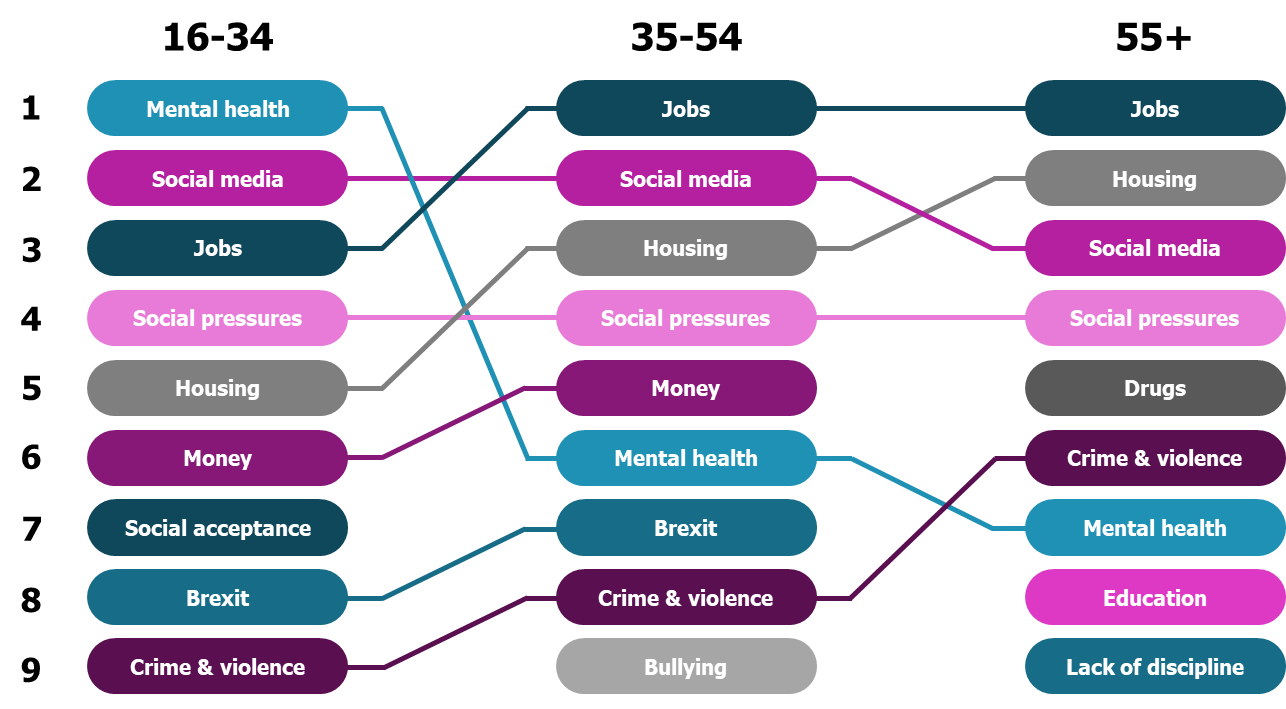Adam Lalák
Young people have heard it all. They get pitied, deplored, revered, stereotyped, and mocked. While some denounce them for refusing to grow up, others lament the fact that they grow up too quickly. One thing is certain: the youth are a highly conflicted part of society. Their life expectancy is higher than ever before, and they have immense possibilities at their disposal. At the same time, uncertainty looms over their future. From rising inequality to scary new technologies to climate change, young people can expect to live lives that will be quite unlike those of any previous generations.
Charities working with young people are consistently one of the public’s most favourite type of charity.[i] To maintain this position, they need to make sure to stay relevant and keep in touch with the actual problems young people face. But what are these problems? Is it even possible to say something meaningful about an entire generation? We partnered with the YMCA to investigate this issue. We asked a nationally representative sample of 1000 respondents one simple open question: what do you think is the biggest issue for young people today?
Figure 1. Top 9 challenges for young people according to different age groups.

Source: Charity Awareness Monitor, January 2019, nfpSynergy | Base: 1,000 adults 16+, Britain
A lot of the media discourse about young people today revolves around youth unemployment and lack of housing. As one commentator recently put it, young people’s future is jeopardised by “no jobs, no homes, no services”.[ii] The data we have collected mirrors this view. Issues relating to jobs – such as a stagnating economy, automation of some professions due to artificial intelligence, and even rising standards of what constitutes a “meaningful” job – were the most commonly named issues for young people in our survey overall. Housing-related issues ranked third.
“Although the job market is extremely saturated, young people face an immense amount of pressure to get a well-paid job, house, marriage, children, travel, etc, when it just isn't feasible anymore to be able to do it all (...). Mortgage deposits and housing prices are rising, making it unrealistic to able to buy a house on your own salary alone until you're around 50,” one respondent said. This summarises a common sentiment expressed throughout the survey. Young people want to live a certain way, but the economy is failing to support them due to a growing population, privatisation of services and increased prices of everything.
However, this is not the end of the story. When we zoom in at how young people themselves feel, a very different picture emerges. For 16-34-year-olds, by far the most severe challenges of today are mental health and social media. These respondents feel that mental health problems are increasingly prevalent amongst their generation. This perception is not unfounded; a recent study published by the NHS showed that mental disorders are, in fact, on the rise amongst people under 19.[iii] They blame social media, lack of opportunities and constant exams, amongst others.
One challenge for charities working in this field is to create space in which young people feel comfortable to open up about mental health. One of our youngest female respondents complained that she feels it is “not fashionable” to talk about one’s own feeling to other people these days. Some other respondents pointed to the lack of support that people with mental health problems receive. This shows that there is clearly much space for charities to intervene.
It is important to bear in mind, however, that charities need to be careful about how they approach this topic. A few youngsters complained in our survey that mental illness has become “trendy” to the extent that some people allegedly end up “faking depression”. In the words of one of the respondents, because of this trend, “people who are seriously mentally ill can't get the help they need or are afraid that their peers will think it's just attention seeking”. It is unclear to what extent this perception reflects reality. However, it is something those working in mental health campaigning should bear in mind.
The survey also revealed a range of other generational differences. Take technology. A number of respondents mentioned that young people today suffer from diminished social skills due to the amount of time they spend in front of screens. Someone described this as the “lack of real contact and overuse of the internet and texts”. However, a close examination of the data reveals that this view is almost exclusively upheld by people over 35. Respondents below 35 themselves express no concern that the use of technology prevents them from socialising.
On the contrary: the youth find technology almost too sociable. The fact that they see social media as the second largest problem for their generation demonstrates the extent to which technology has penetrated their social reality and inflated social pressures. In the words of one respondent, “if you don't share everything you will be judged by friends but if you post something ‘boring’ or ‘uncool’ you will also be judged. It’s hard to win!” It is too early to assess how exactly the heavy usage of social media will affect the minds of the youngest generation. What the data clearly shows is that young people are worried about it, and would like more answers as to how to navigate this territory.
One lesson from this study is that your perception of youth’s problems does not always match what young people themselves feel. They do recognise the need for help; however, this is often in areas that go completely unnoticed by older generations. This is why doing research is so important. Older generations should never assume that they know how young people feel.
Another lesson is that it is hard to generalise. Many of our female respondents, for example, talked about body image insecurities; many males mentioned phone addiction. Everyone’s experience is different. Charities need to pay close attention to who they are aiming to support, what approach they take and what language they use. Young people are a complex territory and understanding them requires patience.
[i] Charity Awareness Monitor (2018)
[ii] No jobs, no homes, no services: how inequality is crippling young people. The Guardian, December 2018, https://www.theguardian.com/society/2018/dec/05/jobs-homes-services-inequality-young-people
[iii] Mental Health of Children and Young People in England, 2017
Mental health at no.1 for
Mental health at no.1 for young people fits in with what the youngsters in the Youth Parliament for Wales are saying: https://www.youthparliament.wales/

